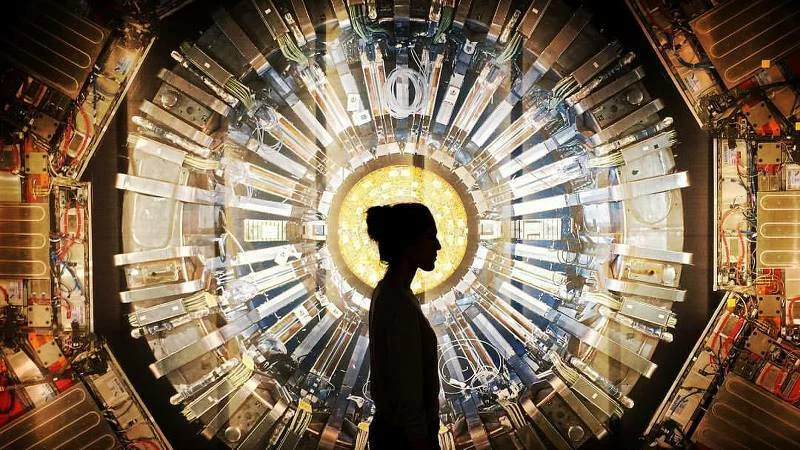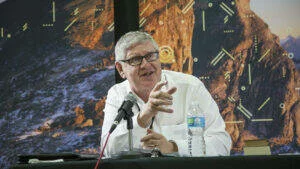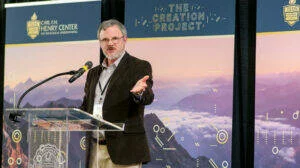I have just been reading about the exciting hunt for the Higgs boson—
a rather dramatic way to put it, since the scientists involved were not, actually, hunting for a boson, but looking to discover whatever was out there.Jon Butterworth, Smashing Physics: Inside the World’s Biggest Experiment (London: Headline, 2014). In this case, however, they indeed found the particle physics had been waiting 40 years for. Yes, that’s right, combined data sets from the ATLAS experiment looking at two-photon mass distribution and four-lepton mass distribution, as well as other decay channels, gave a “5 sigma significance.” What? Well, a bump was seen on a graph, a lot of times. Or, in other words, the Higgs boson was discovered.
Peter Higgs and two others were eventually awarded a Nobel prize, but the experimental effort to confirm the theory that made Higgs’ name so famous was massive. Two major experimental groups—ATLAS and CMS—each involved thousands of people. Data was amassed that would amount to around 5 km of CDs stacked on top of each other. The ‘hunt for the boson’ also required the existence of the Large Hadron Collider near Geneva, a massive particle accelerator 27 km in circumference, around 100 m underground, built in collaboration between Japan, the United States and India, with many contributions from other countries. The machine cost nearly 5 billion US dollars to build, and costs around 1 billion US dollars to run every year.
The machine cost nearly 5 billion US dollars to build, and costs around 1 billion US dollars to run every year.
It’s “Big Science,” which increasingly attracts opposition from both within and without the scientific community. From within, scientists object that too much money is being spent on a small number of projects, starving funds from other, less spectacular, research efforts. From outside, the objection can be more general. “Higgs boson?”—many of the general public may well say. Big deal. And we spend billions on this?
Indeed. Finding the Higgs boson was a big deal, a multi-billion deal, at a time when the financial crisis meant thousands were out of work and losing homes, in a world where at any time millions go without food and live in poverty. Where children die of curable diseases or live as orphans scavenging rubbish dumps. Where millions of lives are a sheer drudgery of walking miles to find drinkable water, every day. How do we, as a race, justify spending so much money to find a blip on a graph?
Certainly the question needs to be raised by Christians. To what extent can we justify spending so much money on things that satisfy the intellectual curiosity of a few, when we are called to care for the poor? Triumphalist proclamations of the human spread of understanding do little to allay this concern. The scale of excitement was massive, people describing the Higgs boson as “the God particle,” no less. It was claimed that this discovery would extend human understanding in the quest that Stephen Hawking famously said years ago would eventually uncover the mind of God.
In practice, it seems that such fundamental research is trying to do the opposite. This quest, in the minds of many who undertake it, is specifically reducing the mind of God, claiming ground from those whose faith commitment to God is seen as irrational in the face of the mounting evidence for the physical understanding of the universe. Is this the project for which we want to spend millions of public money? The quest to extend the dominion of materialism?
Actually, my answer to all these questions is yes, we should.
How can I make that claim in light of what I’ve said above? To start with, at least I can say that there are worse things that millions get spent on. The personal indulgence of ultra-wealthy individuals, for instance. Did you know that you can buy a luxury yacht with two helipads for around 135 million euros? I’d rather increase the sum of human knowledge than have money spent like that.
I think there is a Christian case to be made for supporting fundamental research, even expensive fundamental research.
Yet even more than this kind of grudging admission, I think there is a Christian case to be made for supporting fundamental research, even expensive fundamental research. The reason is not just the utility that emerges from basic research. Researchers are quick to point out that even very esoteric particle physics has led to extremely useful applications. Antimatter is used in PET scanners, very handy for medical diagnoses. Accelerators can generate X-rays for sterilization of food or instruments. Proton beams can be used to target cancer far more successfully than earlier radiation therapy. Also, the technology designed to study high-energy particles is in itself amazing. The detectors that pick up signals from the Large Hadron Collider can also pick out individual photons in X-ray imaging or monitor a person’s exposure to radiation.
That is an impressive list of applications; but even without considering practical utility, as Christians we should say that trying to find out about the most tiny particles at highest energies is a good thing to do. Why? Because truth and knowledge matter. It is a privilege to increase dominion in this way.
But what about the hungry? That is a question for my next post.








Comments
Be the first one to make a comment!